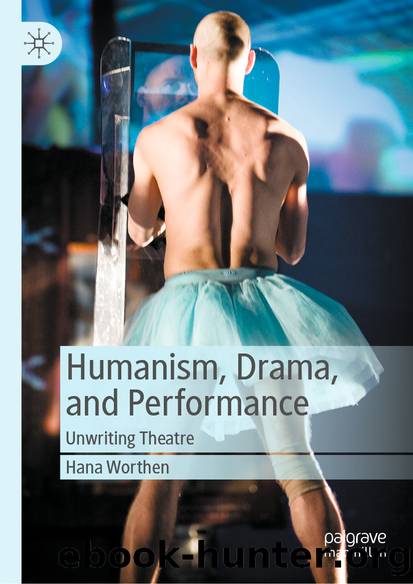Humanism, Drama, and Performance by Hana Worthen

Author:Hana Worthen
Language: eng
Format: epub
ISBN: 9783030440664
Publisher: Springer International Publishing
Public Ecstasy
As a contrapuntal response to the popular violence of the French Revolution, Schillerâs theatre humanism compensates for the over-arousal of the Terror by enlisting an experience of âecstasy,â a regulating force for an alienated humanity and the spectatorsâ transcendent convergence. A somatic practice, Schillerâs theatre of Vergeistigung provides the instrument for sociopolitical reform by investing in an aesthetic activation of the body by way of the âliving formâ to rechannel the modern post-revolutionary estrangement of humanity from itself, from the social order, and so from its full potentiality, an estrangement sustained by economics (property), politics (despotism and tyranny), and the law (legal violence and punishment).43 Conceptualized to remedy these external alienating institutions, aesthetic experience brings the individual as a social being into balance and as a political being into true and thus just action through the immersive subjection to the living theatre. Schillerâs sensory aesthetic education (Greek aesthesis: sensation and perception) positions the spectator less to critique the ârealness of reality,â as Lessing avers, than to engage a feeling of standing out from external circumstances, a feeling of returning to, and becoming one with, the âbeautiful soul,â a feeling of âworld-historical personality, living and acting lovingly in the simultaneity of eternity,â as William F. Wertz put it.44 As each person âcarries in disposition and determination a pure ideal man within himself, with whose unalterable unity it is the great task of his existence, throughout all his vicissitudes, to harmonize,â the purpose of aesthetic educationâand of theatrical catharsisâis to groom that inner ideal into a common socialized expression.45
Schiller, like Lessing, used print to co-create a socially responsive spectatorship; yet in distinction to Lessingâs appeal to the readers-spectatorsâ cognitive positioning, Schiller addressed the singers-spectatorsâ sensory experience. An early example actualizing the theatreâs commitment to the somatic regimeâthe publicâs aesthetic mediationâthat Schiller would explore over the next decade is the second, âimprovedâ 1782 edition of Die Räuber (The Robbers). Augmented with âseveral songs ⦠arranged for the pianoforte, which will enhance its value to the musical part of the public,â the printed play advances a performative practice from reading to singing, to a physical embodied doing and its experience through and beyond the text. At the same time, it embraces the potential of the ecstatic experience of singing as a catalyst motivating the contextual message of the drama outside its narrative temporality.46
While Augustine feared that the sensory appeal of theatre might render the audienceâs conception of tragic suffering gratuitous, Schillerâs 1784â1802 âDie Schaubühne als eine moralische Anstalt betrachtetâ (âThe Stage Considered as a Moral Institutionâ) situates the theatreâs sensual appeal as summoning an innately human, idealizing impulse that galvanizes an immediate and shared immersion âin a universal sympathyâ that transcends the individual spectatorâs modern alienation.The happy man is calmed, the secure made provident. Effeminate natures are steeled, savages made man, and, as the supreme triumph of nature, men of all ranks, zones, and conditions, emancipated from the chains of conventionality and fashion, fraternize here in a universal sympathy, forget the world, and come nearer to their heavenly destination.
Download
This site does not store any files on its server. We only index and link to content provided by other sites. Please contact the content providers to delete copyright contents if any and email us, we'll remove relevant links or contents immediately.
The Japanese by Christopher Harding(1135)
Glittering Images: A Journey Through Art From Egypt to Star Wars by Camille Paglia(829)
Watercolor With Me in the Forest by Dana Fox(790)
A Theory of Narrative Drawing by Simon Grennan(783)
The Story of the Scrolls by The Story of the Scrolls; the M(767)
Boris Johnson by Tom Bower(654)
Frida Kahlo by Frida Kahlo & Hayden Herrera(631)
This Is Modern Art by Kevin Coval(631)
The Art and Science of Drawing by Brent Eviston(620)
AP Art History by John B. Nici(619)
Banksy by Will Ellsworth-Jones(600)
About Looking by John Berger(597)
Van Gogh by Gregory White Smith(587)
Scenes From a Revolution by Mark Harris(584)
War Paint by Woodhead Lindy(582)
Draw More Furries by Jared Hodges(573)
Ecstasy by Eisner.;(564)
Young Rembrandt: A Biography by Onno Blom(549)
100 Greatest Country Artists by Hal Leonard Corp(543)
